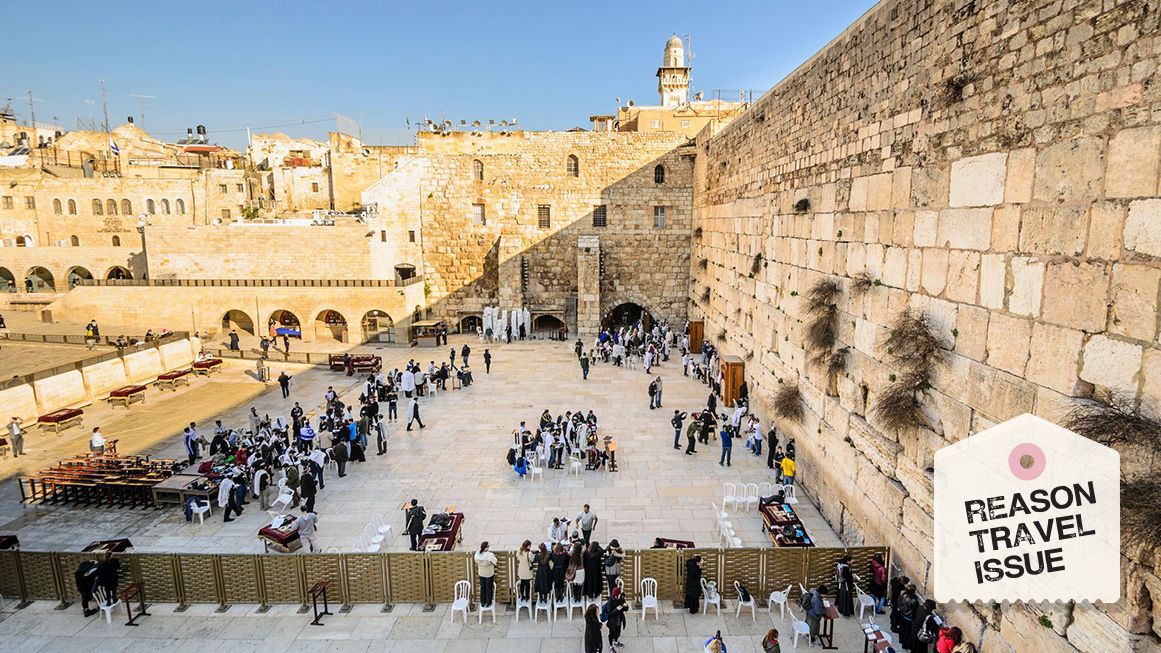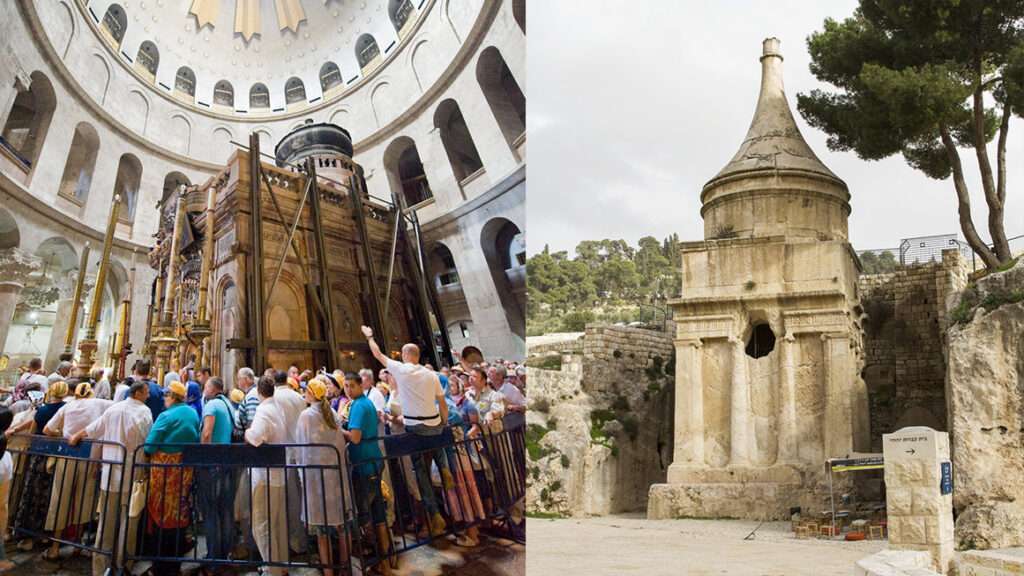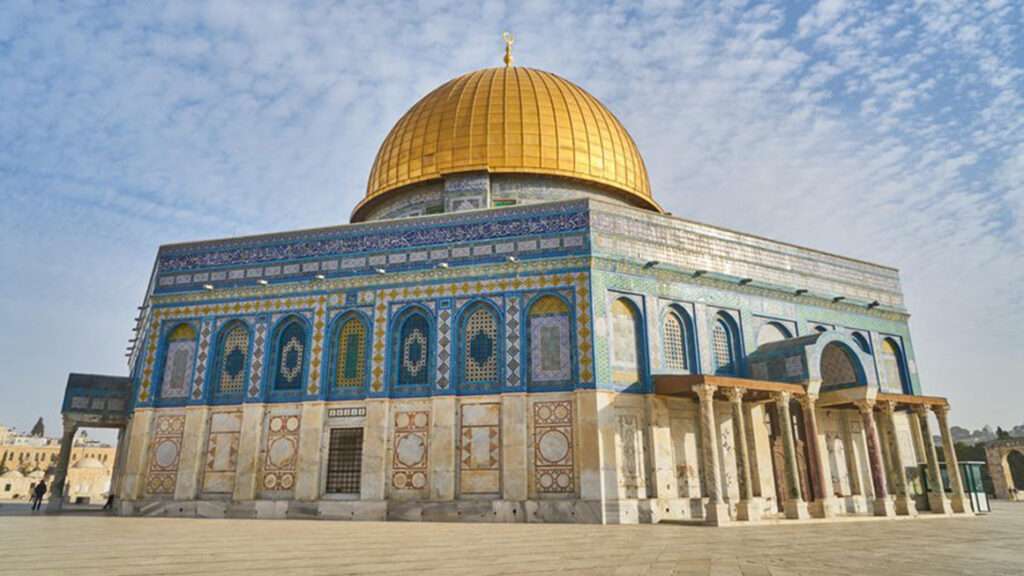Conflicts and Contrasts Make Jerusalem Endlessly Fascinating
The City of Peace has been a locus of conflict for a very long time—a story that continues to this day.

This is part of Reason's 2025 summer travel issue. Click here to read the rest of the issue.
The Church of the Holy Sepulchre, traditionally identified as the site of Jesus Christ's crucifixion and resurrection, is shared by half a dozen denominations under a baroque "status quo" agreement signed in 1757. The agreement, which could be viewed as an attempt to reduce conflict by establishing something like property rights, aimed to prevent interdenominational violence, which nevertheless occasionally breaks out between clerics with contradictory views of the prerogatives assigned to each group.
Near the church's entrance is a conspicuous symbol of that uneasy arrangement: a three-century-old wooden ladder that connects a ledge to an upper-level window. Although that section of the building is assigned to the Armenian Apostolic Church, no one is allowed to mess with the "immovable ladder," lest all hell break loose.

Old as they are, the clashes that inspired the status quo pact are recent by local standards. The original church, completed in 335 C.E. under Constantine the Great, replaced a pagan temple that Hadrian had built over a Jewish burial ground. The church was destroyed in 1009 at the order of Fatimid ruler al-Hakim bi-Amr Allah and rebuilt by Byzantine emperors in the mid-11th century.
All of that amounts to a small but representative slice of Jerusalem's 5,000-year history, which features a long succession of powers contending for control of the same territory, including Canaanites, Egyptians, Israelites, Assyrians, Babylonians, Persians, Greeks, Romans, Byzantines, various Arab caliphates, Crusaders, Mamluks, Ottomans, and a fading British Empire. The City of Peace has been a locus of conflict for a very long time—a story that continues to this day.
The status of Jerusalem, which was divided between Israel and Jordan until the Six-Day War of 1967, has always been the trickiest issue for negotiators who imagine a two-state solution to the Israeli-Palestinian conflict. While both sides claim history is on their side, a longer view reveals a series of conquests and legal regimes that makes the question of just or rightful ownership difficult to resolve in any definitive way. For visitors to Jerusalem, the upside of that complicated history is that it left behind traces of all those civilizations, piled one atop another.
You can get a sense of that history at the Israel Museum (in West Jerusalem, near the Knesset) or the Rockefeller Archaeological Museum (in East Jerusalem, near Herod's Gate), both of which are well worth a visit. But there is no substitute for walking around the city, which is endlessly fascinating.
The first settlement in the area dates to 3000 BCE. It was located near the Gihon Spring in the Kidron Valley, which is connected to the Pool of Siloam in the City of David by a 1,750-foot tunnel. The Hebrew Bible describes the tunnel as the work of Hezekiah, the Judean king whose reign ended around 687 BCE. You can still walk or wade (depending on the weather) through that tunnel, although you may have to crouch a bit to avoid bumping your head.
Nomenclature in and around the Old City can be confusing. The Tomb of Absalom, for instance, has nothing to do with Absalom, and the Tower of David has nothing to do with King David, except that he reportedly was a musician and the site that bears his name is a memorable setting for outdoor concerts. The Jerusalem Light Festival, held in June each year, is another striking contrast of old and new, featuring illuminated displays and projections against ancient walls and buildings.

The Western Wall, the main Old City attraction for observant Jews, is a bit of a puzzle. Although it was the first section of the retaining wall around the Temple Mount that became accessible to Jewish worshippers after the 1967 war, it is not obviously holier than any of the subsequently exposed bits. To the left are tunnels along the retaining wall, where a guided tour sheds light on the question of how low-tech builders managed to cut, transport, and place massive blocks of Jerusalem stone weighing anywhere from two to 600 tons. To the right is the Ophel Archeological Park, where you can walk on a paved street from the Second Temple period and see the remnant of an overpass above the street, along with ritual baths from the same period and Byzantine homes with mosaic floors.
There is a lot more to see in the Old City, including the Arab Souk and the Temple Mount itself, which is now the site of the Dome of the Rock and Al-Aqsa Mosque, distinctive features of the Jerusalem skyline. You can get a pretty good overview by walking on the northern and southern ramparts of the Old City. The northern walk runs from the Jaffa Gate to the Lions' Gate, while the southern walk begins at the Tower of David and ends between the Zion Gate and the Dung Gate—the counterintuitive name for the entrance closest to the Western Wall.
When I lived in Jerusalem several years ago, I enjoyed the free walking tours that used to leave from City Hall on Saturdays, which frequently ventured beyond the usual points of interest. The subjects included leper asylums, Mamluk architecture, 19th century accommodations for Russian Orthodox pilgrims, and the Templer origins of the German Colony neighborhood. There is always more to learn about the city, often in places you thought were familiar.
Another relatively obscure attraction will be of special interest to libertarians. Although the Ministry of Finance's Tax Museum on Agripas Street tries to put a positive spin on the government's forcible extraction of revenue, the exhibits reflect centuries of resistance to such demands.
In addition to all the historical and religious sites, Jerusalem is a modern city of about 1 million people, more than twice the population of Tel Aviv–Yafo. There is no beach, but the weather is less humid and more pleasant than in cities along the Mediterranean, with cool breezes to relieve the summer heat. And while Tel Aviv fans may not be impressed by Jerusalem's nightlife, it has come a long way in the last few decades.
The Machane Yehuda market area, which features a plethora of shops selling everything from baked goods and fresh produce to luggage and hardware, used to shut down at night. But now it comes alive with music and crowds drawn by a range of bars and restaurants. Other lively spots include the Ben Yehuda pedestrian mall, the Mamilla mall (northwest of the Jaffa Gate, near the intersection of King David, King Solomon, and Agron streets), and Tachana Rishona, an outdoor mall on the site of an old train station at the end of Emek Refaim Street.
Like Jerusalem's nightlife, Israeli beer, wine, and liquor have undergone a renaissance. Budweiser-like lagers have been joined by a wide range of styles made by craft brewers across the country, vintners in several distinct regions produce highly rated wines, and microdistillers make better-than-passable gins and whiskies.
For whiskey in Jerusalem, my favorite spot is the cozy Glen Whisk(e)y Bar, which has an impressive selection. The owner of that place also operates the Rabbit Hole, a whimsically decorated gin bar on Yanai Street, and Biratenu, a beer bar on Hillel Street. The better cocktail bars include Zuta, tucked in the back of a restaurant on King David Street called 1868, and the Gatsby Cocktail Room, a speakeasy-style joint on Hillel Street. The latter is easy to miss if you don't know it's there—which is true of many things that are worth exploring in Jerusalem.
All of that sounds cool, you may be thinking, but is it worth the risk of dying in a terrorist attack? Like the danger of mass shootings in the United States, that risk has always been much lower than you might surmise from news reports, and that remained true even after Israel's latest war with Hamas began in October 2023.
The Israel Security Agency has reported four civilian deaths from terrorism in Jerusalem since then, all of which occurred during the same incident on November 30, 2023. Israeli defense systems have been remarkably effective at neutralizing rocket and missile attacks, with no deaths reported in Jerusalem. And overall, crime rates in Israel are much lower than crime rates in the United States. Jerusalem looks quite safe compared to Dallas, where I live, for example.
In fact, given the ongoing territorial disputes, life in Jerusalem is remarkably peaceful. For the most part, people of different faiths, cultures, and ethnic backgrounds manage to coexist, their tensions lubricated by commerce, the need to accomplish quotidian tasks, and a mutual interest in avoiding open conflict. That situation is far from ideal. But as the clerics at the Church of the Holy Sepulchre could tell you, it is preferable to the alternative.
Editor's Note: As of February 29, 2024, commenting privileges on reason.com posts are limited to Reason Plus subscribers. Past commenters are grandfathered in for a temporary period. Subscribe here to preserve your ability to comment. Your Reason Plus subscription also gives you an ad-free version of reason.com, along with full access to the digital edition and archives of Reason magazine. We request that comments be civil and on-topic. We do not moderate or assume any responsibility for comments, which are owned by the readers who post them. Comments do not represent the views of reason.com or Reason Foundation. We reserve the right to delete any comment and ban commenters for any reason at any time. Comments may only be edited within 5 minutes of posting. Report abuses.
Please to post comments


JS;dr
VD;dr. VD (Venereal Disease) is some BAD shit! Go see the Dr. if you've got the VD!!! THAT is why I say VD;dr.!!!
(Some forms of VD also cause bona fide mental illness… THINK about shit! VD is NOTHING to "clap" about!)
So SayETH SypHLliTiC SQuirreL!!
What other nicknames did your mother give to you?
On the rare occasions when sarc is here, he only talks about Ideas™ .
As he is the One True Libertarian. And totally not a democrat in any way.
Is that meant for me?
SQRLSY doesn't take my posts seriously, as he is smart enough to know they aren't serious. Never have been. We've been back and forthing for a few years now. I guess if you paid attention to anything else besides the 'Mean Girls' and your daily search to make the case for 'Dems did it first' you may have noticed.
The Squirrel is more than able to counter on his own. But your extremely clever insult is noted by all of my trailer park brethren. Haha. Got me!
Wow...
You didn’t answer my question.
You never answer mine, you weak, frightened little pussy.
And yet I did.
Why should anyone answer your questions when we all know your answer is "fuck those people".
https://reason.com/2025/07/04/69-percent-of-americans-say-american-dream-is-not-dead/?comments=true#comment-11115307
InsaneTrollLogic won't answer these questions... 'Cause shit HAS no answers, to these kinds of questions!!! (Evil is evil, and has NO excuses, twatsoever, shit seems! Evil is ass evil does and says, and shit is ass shit does and says! WHY is evil evil? I have NO idea here, and evil has NONE, either! Shit just IS!!!)
Twat an UDDER slurprise!!!!
Gray box says what?
InsaneTrollLogic won't even read the unclean things from the unclean ones... 'Cause InsaneTrollLogic is obliviously SUPERIOR to the unclean ones! All that InsaneTrollLogic needs to do, is to point and laugh at the stuff that shit is TOO stupid to read, and laugh! And if OTHER stupid tribalists agree, and laugh ass well, then shit PROVES that InsaneTrollLogic IS yea verily Slurperior to stuff that shit is unwilling or unable to read and cumprehend!
NONE are ass blind ass those who willfully and stubbornly REFUSE to look and see!
Gay box says what?
InsaneTrollLogic is too lazy and-or stupid to read shit for shitself, and so begs UDDER udderly stoooopid tribalists to read wisdom for shit! HOW udderly stoopid and lazy can shit get, anyway? InsaneTrollLogic's Highest Attainment, shit seems, is to SNOT have read some stuff!
JS;dr
Or watch The Life of Brian instead.
And overall, crime rates in Israel are much lower than crime rates in the United States. Jerusalem looks quite safe compared to Dallas, where I live, for example.
ALL HAIL HARM REDUCTION!
Wait... wait... holy shit... is this Sullum admitting that crime is even a problem in the U.S.?
When that guy was in front of my house the other day, firing a Glock with a giggle switch I kept having to remind myself that the U.S. is safer than ever because Sullum told me so...
Sure if you're cool with disparate outcomes.
Since every cause has multiple effects and every effect multiple causes, the universe is disparate outcomes by necessity. So if you are cool with reality...
Reality is white supremacy.
It should be remembered that over the years several groups of Israeli Jews have put forward crazy suggestions that the Dome Of The Rock and the al-Aqsa Mosque should be blown up. Some of these groups also favor the crazy idea they call Greater Israel. If the former should actually occur, Israel would suffer great loss in international public opinion. Unfortunately, the latter is favored (on the sly) by Bibi Netanyahu and his far-right coalition. The plan is sometimes described as leading inevitably to ethnic cleansing, since Greater Israel would be exclusively a Jewish state.
I'm not a religious person, but when I visited Jerusalem 50 years ago I sensed an unfamiliar spiritual atmosphere all around, in the market, in the churches, in the mosques, in the synagogues. There is room in Jerusalem for all faiths, provided that all faiths respect all the others.
"...I sensed an unfamiliar spiritual atmosphere all around..."
I had a person tell me something along those lines about the "Wailing Wall", which this person visited... I didn't ask for more details, sad to say. Something about an almost-palpable ancient feeling or spirit, somehow like a yellow gas drifting around? How does one describe the indescribable, anyway?
Got any more details you care to share?
Jerusalem now belongs to the Jewish State of Israel by right of conquest. If some other nation manages to take Jerusalem away from Israel, the city will then belong to them by right of conquest. There is no other way to acquire a city in that region.